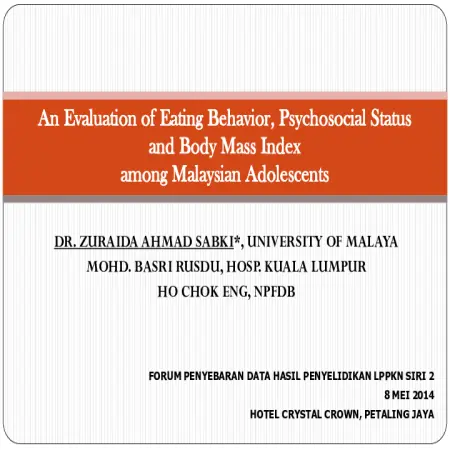|
An evaluation of eating behavior, psychosocial status and body mass index among Malaysian adolescents
|
|
: 86842 Views : |
| Item type | Conference or Workshop Item |
| Subjects | 300 Social sciences > 304 Factors affecting social behavior |
| Division/Agency | LPPKN - National Population and Family Development Board, Malaysia: Population and Family Research Division |
| Keywords | Adolescents, Body mass index, Eating behaviour, Reliability, Validity |
| Additional Information | National Population and Family Development Board in collaboration with Population Studies Unit, Faculty of Economics and Administration, University of Malaya. |
| Abstract | This study is an attempt to produce an abbreviated Malay version of Weight and Lifestyle Inventory (MWALI), as an evaluation tool to assess eating and related bio-psychosocial factors among adolescents attending kafe@TEEN, Kuala Lumpur. The MWALI was translated ‘forward–backward’ from English to Malay and then administered to 135 adolescents to assess the factor construct of the eating behaviour and its relationships with the demographic profile, dysphoria, global self-esteem and body mass index (BMI). The exploratory factor analysis of the eating behaviour yielded five factors are Negative Emotion, Poor Impulse Control, Social Cues, Snacking and Early Meals in relation to over-eating which were significantly and positively correlated with BMI. Eating in response to Social Cues was negatively correlated with self-esteem, overeating at Early Meals was positively correlated with dysphoria. Female has significantly higher mean score of eating in response to Negative Emotion and eating in response to Social Cues. MWALI is appropriate for assessing eating behaviour and associated bio-psychosocial factors among overweight and obese adolescents in the primary care setting in Malaysia. |











